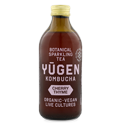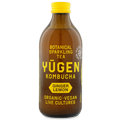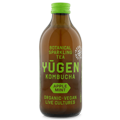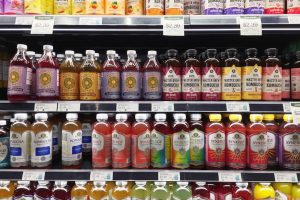
When we look back in history there is plenty of evidence that the use of herbs is as old as humanity itself. People used herbs as food, clothing, building materials and cures against diseases throughout thousands of years. In this blog we want to shed a little light on the fascinating world of herbs and why you can find some of them in our kombucha.

Kombucha ingredients
Although the definition of kombucha as 'fermented tea' is pretty clear, there are many differences in ingredients or ways that kombucha can be made.
The basic ingredients of authentic kombucha are water, tea, sugar, bacteria and yeast. Normally a blend of green and/or black tea is used. However, Yugen Kombucha, doesn't stop there. Besides just using black and green tea, Yugen also incorporates 4 different aromatic and healing herbs in the mix.
Herbal teas, or tisanes, definitely deserve a spot in the fascinating world of teas. Herbal teas can consist of flowers, roots, stems, leaves and even fruits. Every one of these herbs contributes flavour, aroma but also functionality. The variety of green and black teas is immense but why limit yourself to just traditional tea when there is a world of plant diversity to choose from.

Herbs in history
If you look up 'herbs in history', you inevitably end up in the medicinal field. Throughout history mankind has relied heavily on herbs to cure certain diseases. It was largely based on trial and error to discover which plants worked and which didn't. Obviously, this was not an easy, nor safe job. Imagine yourself sampling stinging nettle or worse hemlock (the infamous plant that supposedly killed Socrates). But even random foods can contain toxins. The pits of apples contain cyanogenic glycosides, a mild poison. About 200 seeds or 20 apple cores would be enough to receive a fatal dose.
Every civilization, from Mesopotamia, ancient Egypt, Greece and Rome to India, China and later the Americas, added useful medicinal knowledge to the ever growing herbal database. Many books were written by famous herbalists, such as Hippocrates, 'the father of Western Medicine' or Dioscorides, whose book 'De Materia Medica' was used for more than 1500 years.

During Dioscorides time frame (about 2000 years ago) the fascinating trend of 'Doctrine of Signatures' developed all over the world. It states that herbs resembling various parts of the body can be used by herbalists to treat ailments of those body parts. For example, the herb 'Eyebright' slightly resembles the shape of an eye and therefore was thought to be a cure for eye infections. Similarly the herb 'Liverwort', with some imagination shaped like a liver, was supposed to cure liver related diseases.

During the 16th and 17th century the doctrine was everywhere in the West. The persistence was partly due to a very religious society. God had shaped certain plants to resemble human organs as a clue, and we need to take the hint. A very dangerous anthropological view of the world, which ended up in many casualties.
Now, thanks to scientific research, we know that this theory doesn't hold up. From the end of the 19th century much of this traditional plant medicine was gradually eliminated in favor of evidence based pharmaceutical drugs. Many of these originate from plant sources. Examples include aspirin (from willow bark), digoxin (from foxglove), quinine (from cinchona bark), and morphine (from the opium poppy). Today, more than 60% of cancer therapeutics on the market or in testing are based on natural products. Of the 177 drugs approved worldwide for the treatment of cancer, more than 70% are based on natural products. *
Synergy in herbs
As much as we love to drink our herbal kombucha, we will not recommend it to cure cancer. But we are very proud of our organic ingredients in each of our flavours. Every herb, flower, stem, root or fruit helps to elevate to overall potency of our brew. When we create a recipe we pay extra attention to the synergies between the ingredients. Some ingredients are good by themselves but great when shared with others.
For example, cold-pressed ginger and fresh lemon juice are fused together with marigold, coriander seed and elderberry to create the ultimate 'elixir of life'. This spicy herbal concoction will provide extra fuel for your inner fire, and transform it into a roaring inferno. That's just our way of saying that it will boost your energy levels!
In total, Yugen uses more than 20 different herbs to brew its flavours. Each herb is unique to a flavour. Of course not every herb is used in the same quantities. Some are very powerful and would dominate the flavour profile when used in large quantities, chili for example. Others have to dominate the flavour profile as they are the base of the flavour, mint for example.
Each herb provides nutrients such as bitters, tannins, essential oils, flavonoids, acids, vitamins and minerals which can have antioxidative, antihypertensive, anti-inflammatory, antidiabetic, antimicrobial and therapeutic properties.* Thyme (in our Cherry Thyme flavour) for example contains thymol and carvacrol, which are beneficial for the respiratory tract, and caffeic acid and chlorogenic acid which are beneficial for the digestive tract.

Kombuchas without additives
Most kombucha brands offer multiple flavours. But not every brand creates their flavours in the same way. Yugen deliberately chooses to only use 100% natural ingredients. In contrast to some other brands you will not find any additives, aroma's, concentrates or extracts on our ingredient list.

We don't take shortcuts in our process. All of our flavours are created by 'just' using dried tea, herbs and juice (cold-pressed whenever possible). We stay away from processed foods as much as possible, that way we preserve the maximum amount of bio available compounds in our brew. For example, to create our Apple Mint flavour we use pure organic apple juice and heaps of dried spearmint, a lot of rosemary, some elderflower and just a bit of stinging nettle. The result is a balanced tart brew with a hint of floral herbal freshness. Is it easier and cheaper to just add a few drops of aroma? Yes. Do we want this in our premium booch? No. That simple!
Now go out there and choose your kombucha wisely!
 I like Yugen Kombucha
I like Yugen Kombucha
 J'adore Yugen Kombucha
J'adore Yugen Kombucha






